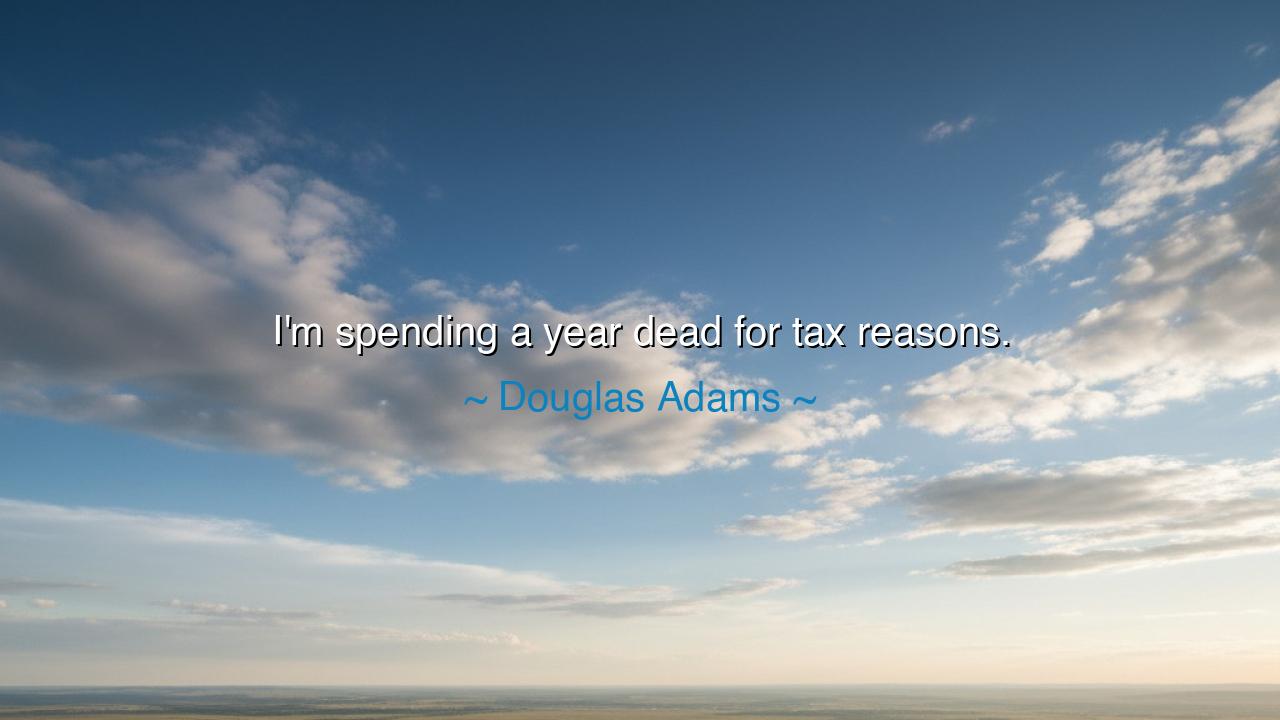
I'm spending a year dead for tax reasons.






In the scrolls of modern wit, there stands a line both humorous and profound: "I'm spending a year dead for tax reasons." Thus spoke Douglas Adams, the wandering sage of absurdity, whose laughter concealed deep wisdom about the human condition. Though the words shimmer with jest, beneath them lies a quiet truth — that many among us live not for life itself, but for the endless burdens of duty, law, and obligation, until the soul feels as though it has retreated into the shadows, waiting for permission to live again.
Behold, the irony of the age of progress! Man has conquered sea and sky, reached beyond the stars, and yet is ensnared by invisible chains — of bureaucracy, of taxes, of systems devised in the name of order. The phrase "spending a year dead" is no mere comic fancy; it is the sigh of one who finds that even existence has been taxed, that even joy must be justified in the ledgers of the world. Adams, in his infinite mirth, reminds us that when life becomes too entangled in the machinery of reason, the heart seeks refuge in the absurd, as a drowning man seeks air.
In ancient days, Diogenes the Cynic walked barefoot through the streets of Athens, carrying a lantern in daylight, seeking an honest man. When questioned why he rejected wealth and comfort, he replied, “I wish to live free.” And yet, centuries later, men and women bind themselves in contracts, debts, and obligations, as though the price of freedom were more than they could bear. To pretend to be dead for a year, as Adams muses, is perhaps the only rebellion left to those who feel crushed beneath the weight of systems that have forgotten the warmth of humanity.
Consider also the tale of Leo Tolstoy, who, at the height of his fame and fortune, abandoned his estate, his title, and his wealth, wandering into the wilderness to seek meaning. The world thought him mad — but perhaps he, too, sought a year “dead,” to escape the demands of a life too carefully measured, too thoroughly taxed by expectation. In his renunciation, he was not running from life, but toward it. To step outside the order of the world — even for a moment — is to remember that one’s soul belongs not to the crown, nor the state, nor the market, but to the eternal wind.
Thus, the jest of Adams is a mirror — a darkly shining one. To "spend a year dead" is not truly to die, but to withdraw from madness, to find again the humor in the absurd, the laughter in despair. The ancients called this retreat anacoresis, the holy withdrawal, when the seeker fled from the city of noise to commune with truth in silence. So too may modern souls find sanctity in stillness — not through death, but through the refusal to be consumed by endless motion.
Yet beware: the wisdom of the fool is not to flee forever. To live “dead” is a season of healing, not an eternity of absence. The return must come, as spring follows winter. For while it is noble to escape the burdens of the world for a time, one must return with laughter and light — else the silence becomes a tomb, not a temple. The great jest of Adams, like the parables of the wise, teaches that humor is armor against despair, and that only those who can laugh at life truly understand it.
So, O seeker of meaning, let this lesson guide you: when the weight of the world becomes too heavy, it is no sin to rest. To "spend a year dead" may mean to take a year to breathe, to think, to dream again without the noise of obligation. But do not stay gone forever. Return, renewed, carrying the flame of absurdity and laughter, for in that laughter lies defiance — and in defiance, freedom.
Thus, remember always: life is a cosmic joke whispered by the universe, and those who laugh last are not mocking fate — they are embracing it. Be not afraid to pause, to play dead, to drop the burdens of sense. For even in absurdity there is truth — and even in mock death, the soul remembers how to live.






AAdministratorAdministrator
Welcome, honored guests. Please leave a comment, we will respond soon